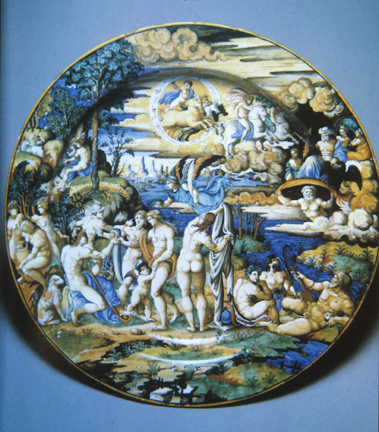This large, istoriato plate was painted between 1545 and 1550 CE in the Urbino workshop of Guido Durantino. Like the previous example, it was based on a large oil by Raphael, "The Judgment of Paris." Renaissance Italian artists were keenly interested in their Roman and Greek history and legends, and publications of Ovid's "Metamorphoses" brought these ancient stories to a Renaissance audience. Ovid was a Roman poet and author, exiled during his own time, who recounted the ancient Greek tales and commented wryly on contemporary Roman affairs. His works were translated into the Italian of the 16th century and sparked a rebirth of interest in these stories which then often found their way onto the canvasses and ceramics of the day. The following is a synopsis of Ovid's retelling of the Judgment of Paris:
"It is said that, when Thetis married Peleus, Jupiter invited all the gods to a feast with the exception of Eris, (known as Strife). When, later she suddenly arrived and was not admitted to the banquet, to make mischief she tossed an apple from the doorway into the middle declaring that whoever was most beautiful should pick it up. Juno, Venus and Minerva each began to claim to be the best looking, and when a bitter quarrel erupted between them, Jupiter ordered Mercury to take them to Paris on Mount Ida and to tell him to be the judge. Juno promised Paris dominion over all lands and greater riches than all men if he favored her; Minerva, that he would henceforth be braver than all and master of every artifice if she were to depart victorious; Venus however promised to arrange for him to marry the most beautiful of all women, Helen, daughter of Tyndareus. Paris preferred the final offer to the earlier ones and declared Venus to be the most beautiful; as a result, Juno and Minerva became enemies of the Trojans. Urged on by Venus, Paris seduced Helen away from Sparta and Menelaos, his host, to Troy and married her; with her came two servants, the former queens Aethra and Thisadie whom Castor and Pollux had awarded to her when they were taken prisoner."

'The Judgment of Paris', Majolica with Luster, Workshop of Guido Durantino, Urbino, 1545-1550 CE, 28" d.


